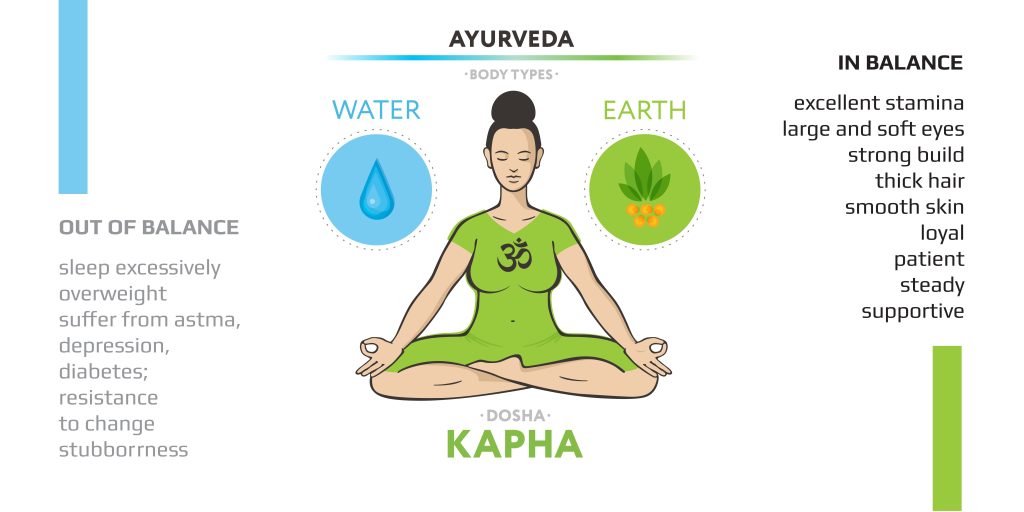Ayurvedic Body Type : Kapha
Introduction to Kapha dosha
Kapha is one of the main doshas in Ayurveda. It is representative of the water and earth elements. The characteristics of Kapha are marked by qualities of lubrication, coldness, and heaviness, which provide stability to the body. The primary responsibility of Kapha is to provide lubrication to various tissues and ensure the proper functioning of immunity and emotional stability. Without Kapha’s lubrication, the body becomes stiff and rigid in movement.

When Kapha is balanced, it provides structure and stability, and when there is an excess of Kapha, it may lead to unwanted mucus, lethargy, and emotional stagnation.
Characteristics of Kapha people
An Ayurvedic practitioner can best determine whether your body’s personal constitution is Kapha-dominant or not. However, there are some general characteristics that are commonly observed in a person with a Kapha constitution. Let us take a look at these characteristics:
- Kapha people have a strong and sturdy build, and they may tend to gain weight easily.
- Due to the balanced Kapha element, they have smooth and well-hydrated hair.
- Kapha individuals possess good stamina and endurance and often do well in sports.
- They are generally calm and composed by nature.
- Kapha people may be able to handle stress well due to their calm and peaceful nature.
- If there is an imbalance of Kapha, individuals have difficulty letting go of their grudges and may even become complacent.
- Kapha individuals like structure and swear by routines.
- They often have a slower metabolic rate, which may lead to weight gain.
- Kapha people generally have a caring and affectionate nature towards others.
How to balance Kapha dosha
If the Kapha dosha becomes excessive or gets imbalanced, the individual might suffer from stagnation both mentally and physically. To counter the nature of Kapaha, which is heavy, cold, and sluggish, they should include practices that are opposite of Kapaha’s characteristics. For instance, opting for lighter and dry foods along with spices may help balance the excessive Kapaha. Spending some time in sunlight, exercising regularly, and maintaining a sleep cycle may also help balance the Kapha. They can also practice pranayama and yoga, which may relieve their mental and emotional stagnation.
Kapha body type in detail
Physical characteristics of Kapha people
Individuals with a governing Kapha dosha or a Kapha constitution generally tend to have a heavy and big build, which is representative of the earth element. They are strong and sturdy, with incredible fitness, stamina, and endurance. Due to the presence of lubrication in Kapha, the skin of the Kapha people is moisturised and soft, and their skin complexion is also bright. Their eyes tend to be large in comparison to the size of their face. The bones are also sturdy, with a high bone density. And the nails of the Kapha individuals are strong and do not chip away or break easily. Their teeth are typically aligned. If the Kapha gets out of balance, an individual may suffer from slowness and sluggish movement.
Mental and emotional characteristics
The mental and emotional characteristics of Kapha people are reflective of the earth and water elements. They are calm and steady individuals with a good degree of emotional stability. Qualities like empathy and being a good listener come naturally to Kapha individuals. They are often slow learners but have a strong long-term memory. They like comforting surroundings and appreciate spending time in cosy environments. They have a tendency to be slow in their decision-making processes; they like to weigh all their options. If the Kapha is imbalanced, the same individuals may be complacent and lazy and may display possessive behaviour in their relationships.
Kapha individuals may enter the field of athletics, the military, or any profession that requires physical prowess. Additionally, due to their empathetic and affectionate nature, Kapaha types may also take up humanitarian, social service, or health care work.
Common Diseases in Kapha people
Kapha dosha, being cold, heavy, and moisturising (watery), can affect the same elements present in the body. Some of the common health conditions seen in Kapha individuals are as follows:
- Obesity
- Drowsiness
- Lethargy
- Sinusitis
- Chest congestion
- Cold and cough
- Water Retention
- High Cholesterol
- Depression
- Sleep Disorder
- Salivation
- Digestive Issue (Low digestive fire)
- Loss of Strength
If you are dealing with any of the above health conditions or want to know more about your dosha type, book an appointment with YATAN Holistic Ayurvedic Centre. Call us at 1300 552 260.
Diet and lifestyle for Kapha people
An excessive amount of Kapha in the body can be detrimental to one’s health and well-being. Therefore, one must strive to counter the excess of Kapha with diet and lifestyle practices.
Go for an ayurvedic detox. Ayurvedic detox, i.e., panchakarma, is a great way to purge out any toxins, excess water, or bad mucus that might be hampering the optimal health and well-being of the body. The five steps of panchakarma can effectively revitalise and rejuvenate the body.
Maintain a healthy weight. Being prone to weight gain or morbid obesity, Kapha individuals should be mindful of what they eat and exercise regularly to increase circulation, metabolism, and warmth. Staying active is a must for Kapah people to expel any laziness or drowsiness.
Consume foods that are lighter in nature and dry in texture. Incorporate whole grains and leafy greens seasoned with spices such as ginger, black pepper, and cayenne. Avoid cold and heavy dairy items such as frozen yoghurt, processed cheese, and ice cream, as they can aggravate Kapha even more.
Yoga and Pranayama Yoga and meditation may be beneficial in balancing the sluggishness of Kapha. Yoga like Surya Namaskar (Sun Salutation), Warrior Pose (Virabhadrasana), Bhastrika, and Kapal Bhati might also be helpful. The breathing techniques can fill the body with vigour and energy, which are required by a person of Kapha constitution.
Tips for balancing Kapha dosha
Foods to eat/ Kapha Diet
A Kapha diet should include foods that are dry, warm, spicy, light in nature, and easily digestible. A diet for Kapha people should have veggies such as asparagus, kale, broccoli, cauliflower, garlic, ginger, aubergine, celery, lettuce, spinach, tomatoes, sprouts, and okra. In grains, they may consume quinoa, millet, corn, wheat, muesli, etc. Additionally, they may consume fruits such as apples, cranberries, raspberries, dry figs, tamarind, pomegranate, cherries, etc. And if the individuals consume meat, then they should switch to consuming lean meats such as chicken or fish.
Activities/Exercise for Kapha People
For most Kapha people, sticking to an exercise routine of at least 30 minutes is a must. It is also crucial to maintain regularity in your exercise routine. By doing so, you would be able to increase your energy, reduce lethargy, and keep your mind and body vibrant and healthy. Here are some exercises you may include:
- Cardiovascular exercises
- Strength training
- Yoga (such as Surya Namaskar, Ashtanga Yoga etc
- Hiking
- Swimming
- Team Sports
- Pilates
- Interval Training
Please note that the above mentioned exercises should be done only by individuals with a regular health condition. If you have a long standing or underlying health condition, consult your healthcare provider before starting any new exercise program.
Herbs and Supplements to take
To pacify an excessive Kapha dosha, Ayurveda suggests the use of Tulsi (holy basil), turmeric, black pepper, triphala (Amalaki, Haritaki, and Bibhitaki), cinnamon, cloves, fenugreek, cumin, coriander, etc.
To learn more about how to incorporate the above herbs and spices into your daily routine and in what quality, consult with an Ayurvedic practitioner.

*Discover holistic healing with a complimentary phone or video consultation from our expert Ayurvedic practitioner. Start your path to better health today!*























